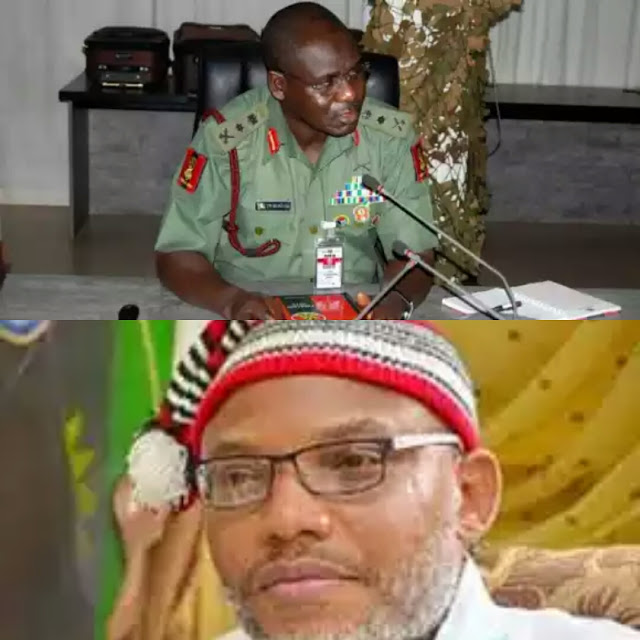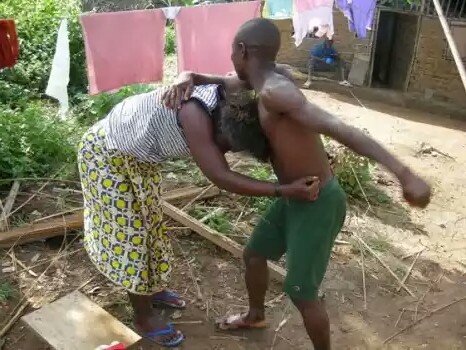Biafra - The Chief of Army Staff, Tukur Buratai confirms that the military is moving from Operation Python dance to Crocodile Smile: Where is Nnamdi Kanu to Dance to this music!?
The Nigerian Army has confirmed that it plans to conduct more exercises to tackle emerging security challenges in the country.
The Chief of Army Staff, Tukur Buratai, made the confirmation on Monday at the commencement of the second and third Quarter Chief of Army Staff Conference in Abuja.
PREMIUM TIMES had on Monday reported that the army plans to launch operation “Crocodile Smile 2” in the South-south and South-west regions of the country.
The report was against the backdrop of a controversy over an exercise by the army in the South-east that raised tension across the region and ignited clashes between separatist agitators and soldiers.
But the Army Chief, a lieutenant-general, said on Monday that the army will carry out exercises only to sharpen personnel skills and prepare them to tackle security challenges.
Mr. Buratai explained that exercises were aimed at focusing personnel in real time operational scenarios as against simulated training situations.
Currently, exercise “Egwu Eke” – Python Dance II is underway in the five South East states – Enugu, Imo, Anambra, Abia, Ebonyi, and Cross River in the South South.
Mr. Buratai said: “I have given the necessary directives for officers to embark on mission specific training at home and overseas.
“This is in addition to effort in strengthening and exploring own local institutions.
“Commanders at all levels are to ensure that orientation cadres are conducted for young officers and soldiers posted to units in order to enshrine aspects of unit regimentation early in them.”
He charged formation commanders in theatre of operations to imbibe the spirit of in-theatre training, based on terrain and the changing “tactics of adversary.”
Mr. Buratai said that evolutionary and global security threats were being influenced by political, economic, social and technological factors.
“Therefore, the need for regular improvement on the existing capacity of the Nigerian Army to be able to deal with present and future security threats is imperative.
“To achieve this, it is paramount to carry out accurate threats assessment in the formulation of the nation’s security policies which would enhance the ability of the Nigerian Army to deal with these emerging internal security threats,” he said.
In an interview with journalist later, the army chief said exercises and training in the army were going on continuously, but only gets to public knowledge when carried out on large scale.
“Since 2015, we have been holding series of exercises,” he said, adding that the exercises were to reassure Nigerians that the army and other security agencies were concerned about their safety and security.
The Nigerian Army has confirmed that it plans to conduct more exercises to tackle emerging security challenges in the country.
The Chief of Army Staff, Tukur Buratai, made the confirmation on Monday at the commencement of the second and third Quarter Chief of Army Staff Conference in Abuja.
PREMIUM TIMES had on Monday reported that the army plans to launch operation “Crocodile Smile 2” in the South-south and South-west regions of the country.
The report was against the backdrop of a controversy over an exercise by the army in the South-east that raised tension across the region and ignited clashes between separatist agitators and soldiers.
But the Army Chief, a lieutenant-general, said on Monday that the army will carry out exercises only to sharpen personnel skills and prepare them to tackle security challenges.
Mr. Buratai explained that exercises were aimed at focusing personnel in real time operational scenarios as against simulated training situations.
Currently, exercise “Egwu Eke” – Python Dance II is underway in the five South East states – Enugu, Imo, Anambra, Abia, Ebonyi, and Cross River in the South South.
Mr. Buratai said: “I have given the necessary directives for officers to embark on mission specific training at home and overseas.
“This is in addition to effort in strengthening and exploring own local institutions.
“Commanders at all levels are to ensure that orientation cadres are conducted for young officers and soldiers posted to units in order to enshrine aspects of unit regimentation early in them.”
He charged formation commanders in theatre of operations to imbibe the spirit of in-theatre training, based on terrain and the changing “tactics of adversary.”
Mr. Buratai said that evolutionary and global security threats were being influenced by political, economic, social and technological factors.
“Therefore, the need for regular improvement on the existing capacity of the Nigerian Army to be able to deal with present and future security threats is imperative.
“To achieve this, it is paramount to carry out accurate threats assessment in the formulation of the nation’s security policies which would enhance the ability of the Nigerian Army to deal with these emerging internal security threats,” he said.
In an interview with journalist later, the army chief said exercises and training in the army were going on continuously, but only gets to public knowledge when carried out on large scale.
“Since 2015, we have been holding series of exercises,” he said, adding that the exercises were to reassure Nigerians that the army and other security agencies were concerned about their safety and security.




Comments
Post a Comment